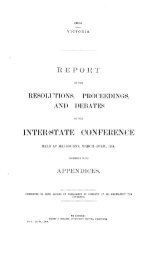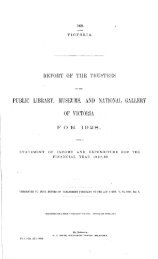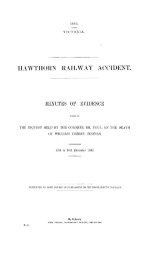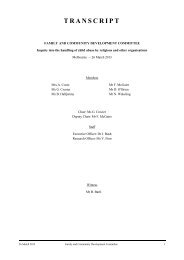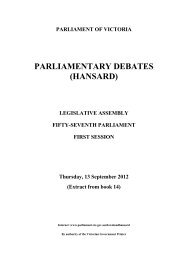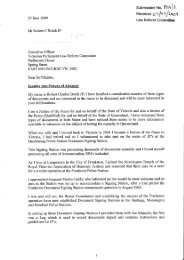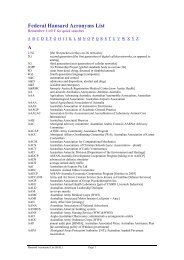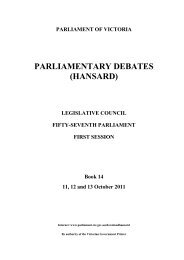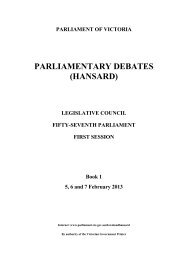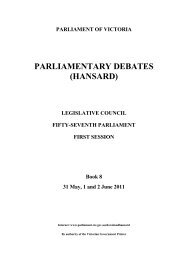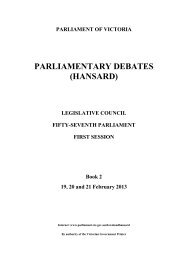Minutes of Evidence p.1401-1509 - Parliament of Victoria
Minutes of Evidence p.1401-1509 - Parliament of Victoria
Minutes of Evidence p.1401-1509 - Parliament of Victoria
You also want an ePaper? Increase the reach of your titles
YUMPU automatically turns print PDFs into web optimized ePapers that Google loves.
Fl.J-.G!'loraith, farmer, that I have returns here from my salesman for the years 1878,1879, 1880, and 1881. Now, inl880<br />
titf'~:;:"faa3 . I bought as good seed oats as the eye <strong>of</strong> man ever looked upon at ls. 10d. a bushel, bags given in. They<br />
·· were bought at public auction in this district.<br />
50668. Hy lvlr. Lon,qmore.-Ancl ordinary oats at 1s. Gd.?-Yes, or less, 1s. 3d.<br />
50669. By the Chainnan.-Were those colonial-grown'?- They were colonial-grown and by<br />
Mr. W. Grant in this district. Now I know the man that grew those must have grown them ut, a loss.<br />
50670. That is after the duty was put on ?-It was the year after the duty wa~ put on, while the<br />
stores in Melbourne were glutted; they had not been cleared out <strong>of</strong> New Zealand oats. We did not participate<br />
in the benefit <strong>of</strong> the duties till the following year, because they shunted all their stuff into Melbourne,<br />
and the stores wero glutt.ecl, and that had to be worked <strong>of</strong>f before we got the advantage <strong>of</strong> it. In 1880 I ·<br />
sold pease ~tt 2s. 2cl. a bushel, barley at ls. 7d.-Cape barley. At the end <strong>of</strong> the season they did rise to<br />
5s. 2cl. for some English barley, but at the en,rly part <strong>of</strong> the season it was nbout 2s. 2d., and I sold<br />
later on at 4~. 6d. This account is from D. :Melville n,nd Company. In 1879, oats ranged from 3s. 2c1. to<br />
4s. 2d.; in 1880, from 1s. 5~d. to 2s. 4d.; and in 1881 m\ts were 2s. 3!d. to 4s. I will give you the price<br />
<strong>of</strong> harlev also. In 1881 it went from 2s. 3.,!,d. to 3s. lld.<br />
50671. What is it now ?-I sold it tl1is year, 400 or 500 bags, at 5s. 2d. I see by the papers l1ere<br />
the evidence <strong>of</strong> Mr. Clapp and other gentlemen before your Commission about oats. I sold him 795 bags<br />
<strong>of</strong>' oats at 3s. 2d. on Tuesday last ; they were a splendid sample <strong>of</strong> oats.<br />
50672. Wlmt did he say in his evidence the price w~\S ; does that agree with his evidence ?-Yes,<br />
his evidence is fair enough as far as it goes ; but I see some evidence here from Mr. McKenzie, I think it<br />
is. He says the duty upon oats ought to be reduced ; he thought it should not be more than 6d. a bushel;<br />
at pre:;entit is 2s. tL cental. He had to buy New Zettland oats, which he dealt with in bond, exporting the<br />
oatmeal. Now, in that matter <strong>of</strong> oatmeal in bond, I believe that the Custom.s revenue <strong>of</strong> the colony has<br />
been "got at," to use a common expression, because they weigh in 40 lbs. <strong>of</strong> oats to the bushel ·am! they<br />
weigh out 40 lbs. <strong>of</strong> oatmeal, and they allow nothing for the debris, and the revenue is defrauded to that extent.<br />
50673. By iYJ.r. Longm,ore.-Ancl the oatmeal is about only 20 lbs. to the bushel ?-They weigh in<br />
40 lbs. and they weigh out 40 lbs.<br />
50674. By the Chai1·nwn.-But you are not sure <strong>of</strong> that ?-I am pretty sure <strong>of</strong> it.<br />
50675. You are only giving us a supposition ?-I have it from a gentleman who has pretty good<br />
knowledge.<br />
50676. You cannot give second-hand evidence? -I ttm not a miller, <strong>of</strong> course. Now barley comes<br />
in 50 lbs. and goes out 40 lbs. in malt; but they should send out 50 lbs. in malt. As to malting in bond, I<br />
am decidedly opposed to 1t.<br />
50677. Whn,t do you say <strong>of</strong> malt ?-Fifl,y lbs. comes in and 50 lbs. goes out.<br />
50678. But there is nothing at all upon it ?-I believe they are doing it at the present time. They<br />
sell our good barley and shunt away the bad stuff. I wish to return to the oat question. I see th~tt some <strong>of</strong><br />
the gentlemen here who gave evidence, I think it is Mr. Aitkin, said that our oats are not good enough to<br />
make oatmeal <strong>of</strong>, that the New Zealand oats are a much superior (l.rticle·to ours.<br />
50679. For that purpose ?-For that purpose.<br />
50680. Is that in accordance with your experience ?~In the great show <strong>of</strong> the world our oats took<br />
the premier position ~·t the Exhibition; and I see Mr. Gibson has given his evidence here, but he ha~ not<br />
said anything upon that point; but he has been in the trade for some thirty years, I think, and he told me<br />
himself that my oats grown in Lancefield (that he bought one day, through Donalcl Melville and Company,<br />
400 or 500 bags, allCl he bougllt :Mr. J. ,J. Daly's, a neighbour <strong>of</strong> mine, whose oats took the premier position<br />
at the show) would give from 5 lbs. to 7 lbs. more ontmeal--thttt is oats from L(l.ncefield--than you could<br />
get from New Zealnncl; and he gave as his reason that ours was finer in the skin and there was less waste.<br />
It has been <strong>of</strong>ten said that we cannot grow oats for milling. That is :Mr. Gibson's evidence to myself, after<br />
having bought my oats and Mr. J. J. Daly's oats the same year.<br />
506tsl. I think that is enough in relation to the question <strong>of</strong> oats. Now about the question <strong>of</strong> barley?<br />
-I would like to call yonr attention to this about oats. Mr. Derham: says, in his evidence, at present<br />
imported oats are worth from 2s. 6d. to 2~. Rd. in bond and tlmt ours are worth 3s. 4cl. I sold mine at<br />
3s. 2d. "This was not," he was informed, "an oat-growing country." We can grow quite enough for our<br />
own people.<br />
50682. Thi,; part <strong>of</strong> the country, we quite understand, is suitable for oats ?-Yes, and so is<br />
Kyneton, and eo is B[tllarat, and so is Gippsland. Anythiug south <strong>of</strong> the Dividing range is oat-growing<br />
country.<br />
50683. As to barley,'[ understand that you are opposed to the removttl <strong>of</strong> the duty upon barley?-<br />
I am decidedly. ·<br />
50684. Are we producing as much barley in the colony as we require for our own purposes?<br />
I believe so, and we can produce any an1otmt, for, uorzh <strong>of</strong> the DiYidiug range, .as fine barley can be grown<br />
as anywhere in the world.<br />
50685. See:ng that we have very nearly, if not quite, overtaken our own requirements, and shall<br />
shortly have a surplus to export, is there nny purpose to he served by keeping the duty any longer ?-I call<br />
that rather a leading question, but I will answer it. I say we can grow plenty <strong>of</strong> barley if the price is<br />
good enough, if they will give us, stty, 5s. a bushel. I do not care to see it higher, ancll would not like<br />
t:o see it lower; I would go in for a sliding scale. If barley gets above that, reduce the dnty. It is a<br />
pnying price to the farmer, (l.ncl a small price will not pay him. We can grow plenty <strong>of</strong> it if they will only<br />
give us the price.<br />
50686. B;lj Jlit·. Longmm·e.-Is that malting barley ?-Yes, malting barley. I got 5s. 2d. this year.<br />
50687. By the Clwirman.-You approve <strong>of</strong> a sliding scale ?-I approve <strong>of</strong> a sliding scale ; they<br />
do it <strong>of</strong>ten in letth1g farms where I CIHne from. I do not think they should go 11p to fa,mine prices. But<br />
I wish to give one <strong>of</strong> my re>t80ns for opposing malting in bond.<br />
50688. I nnderstoocl that you were going to give the reason~ why you oppose the abolition <strong>of</strong> the<br />
duty ?-The abolitiun <strong>of</strong> the duty I think I have givcu a re£Lson against, that we can gww it ourselves.<br />
But in New Zeabntl they get much henvier crop.s than we do, and they are bound, a:,; ftn as I know <strong>of</strong> the<br />
colony, to break UIJ the land to put in English grasses, and they have no market ot their own, and they are<br />
bound to send it to Ylctoria.<br />
1500



